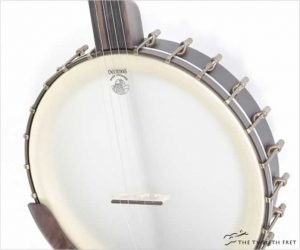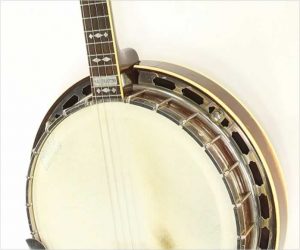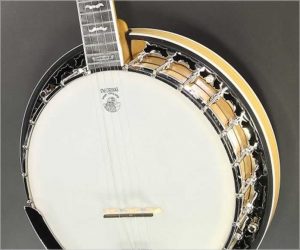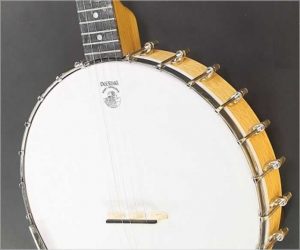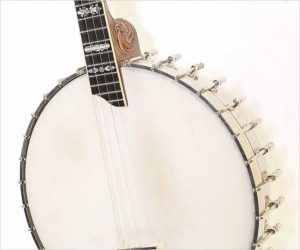The new Vega Vintage Star open back banjo by Deering has arrived, featuring a classic Dobson-style tone ring, Ebony fingerboard and Satin finish! At the heart of the Vintage Star lies a stunning Dobson tone ring. Originally patented by Henry Dobson in 1881, the Dobson balances the low ends with clear highs, and adds just the right amount of sustain to the banjo. The brass Dobson glows from behind the renaissance head, which itself sits on a thinner walled, 12” violin grade maple rim. A knotless tailpiece tops off the set up to produce a classic old-time tone.
Regular Banjo
This is a Vega Professional Tubaphone openback banjo, with a neck from the 1960s and the pot from a 1923 Vega Tubaphone banjo, a conversion common in the 1960s. Vega, now owned by Deering Banjos, is one of the oldest American banjo brands, founded in 1881 in Boston, Massachusetts. This lovely old banjo is a mix of two Vega banjos: a product of 1960s Hootenanny era.
This instrument has sold
MORE →Built largely with Maple, the Gibson PB3 used solid Maple for the neck and pot, and Laminate Maple, stained Mahogany, for the Resonator. The fingerboard is Rosewood – and at the time, even though this was an ‘entry level’ instrument, that meant Brazilian Rosewood. The classic inlay set is executed in Mother of Pearl, with the engraved MASTERTONE block at the next to last fret. All the original hardware is present, including the Grover pancake tuners.
This instrument has sold
MORE →The Deering White Lotus 5-String Banjo by Deering is a resonator back model with no exotic woods, just White Oak and Maple. The bluegrass inspired White Lotus banjo, named for its lotus flower inspired inlay pattern, is centered around the patented white oak rim. Notably lacking a traditional heavy tone ring, the natural white oak rim closely recreates a bright, crisp bluegrass punch, ushering in a new era in playing comfort and sound for today’s banjo player.
Here’s a new item – the Vega White Oak 12 Inch Open Back Banjo by Deering, also available in 11 inch.. This is a lightweight open back model with no exotic woods, just Oak and Maple.
Here, we’re looking at a Vega Style X Number 9 Tenor Banjo, built in Boston during 1926. Typical of higher end banjos of the era, it is adorned with engraved Mother of Pearl Inlays which are in lovely condition, and the engravings have been re-filled. The banjo features a tube-a-phone tone ring and Maple is used for the neck and dowel. The heel is hand carved, also typical of the era. The backstrap, the wood covering the back of the head, plus the head plate, are Rosewood.
This instrument has sold
MORE →